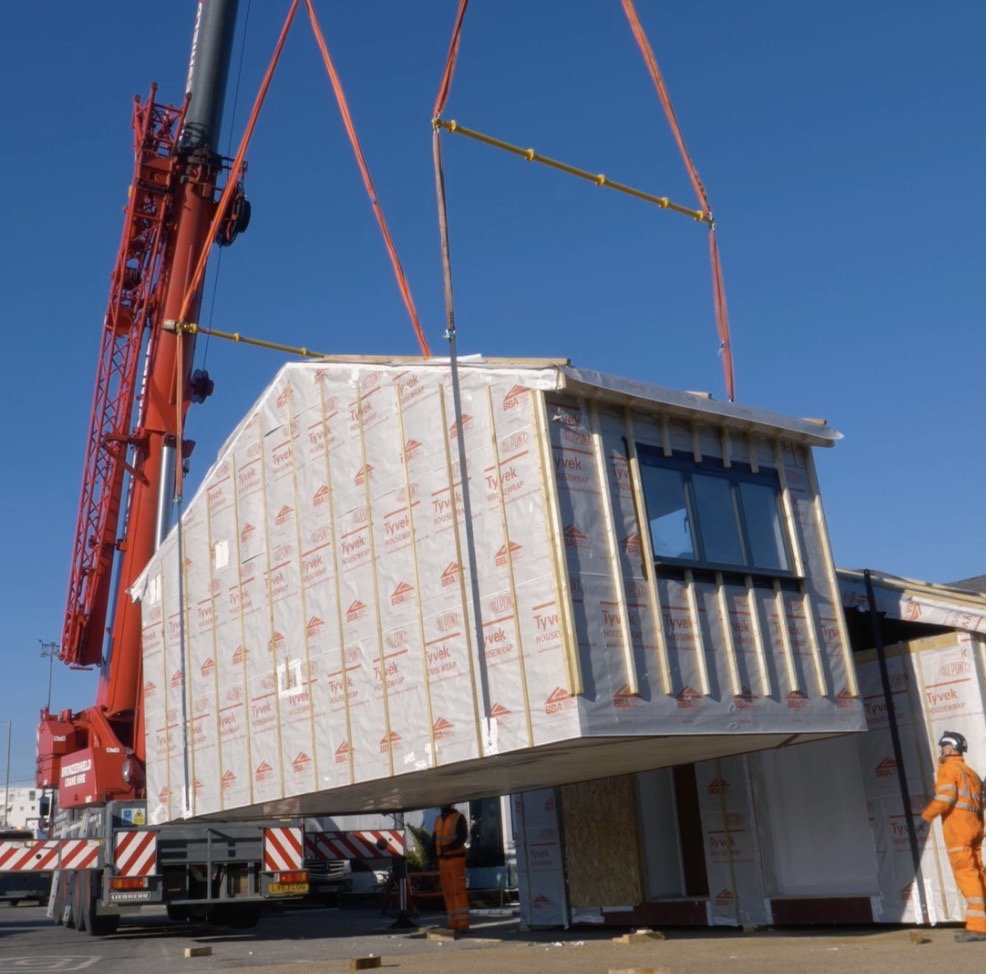Paving the path for the future: building the modular way
The bustling world of construction has seen huge advancements in innovation as it collectively seeks to tackle the dual crises of environmental degradation and housing shortages.
We’ve partnered with Boutique Modern, the only certified B Corp in the UK modular manufacturing industry, to embrace the modular way. From our work together we’ve seen first-hand the immense potential and versatility of volumetric modular construction (VMC).
There’s a perception that VMC is only deployed at scale for schemes delivering hundreds of homes, repetitive in nature and design. Indeed, recent high-profile failures of certain large-scale modular factories have only fuelled this misconception. But the modular approach can work fantastically for small and medium-sized sites. Tight infill sites where it would be disruptive for a conventional construction site to be set up for several months, sites with numerous existing residents where frequent site deliveries would be problematic or sites where the costs of several months of preliminaries would be prohibitive.
A Boutique Modern module being craned into position
So let's explore six ways in which this innovative construction method, when combined with architectural input from the outset, can unlock difficult, tight urban sites, add value and make an important contribution towards solving our environmental and housing crises.
Accelerating the pace: speed and efficiency of construction
Traditional construction methods of building in situ are subjected to a variety of site constraints. From everything the fair British weather throws at us to tight access points, these factors can invariably delay progress on development sites.
Volumetric modular construction (VMC) streamlines the process because units can be built in the sterile and controlled environment of a factory, and only brought to site when ready to be installed on site (bathroom cabinets and all). Pre-assembling modules in factories using a production line approach increases productivity and boosts efficiencies. This, in turn, delivers a more seamless experience on site, reducing the build programme and meaning less disruption for the local area.
Our recent site visit to the Boutique Modern factory was eye-opening
At Mohsin Cooper, we’re exploring where VMC can help to side-step disruption and conflict with existing residents. On complex urban sites, such as developing defunct garage compounds in occupied mansion blocks, a traditional site set up would last around eight to 10 months resulting in noise, deliveries, a lack of site set up space and disruption to shared amenity spaces. VMC removes these conflicts by relocating the majority of construction to the factory.
Air space developments are another prime example: a complex site set up, disruption to existing residents on lower floors, awkward delivery arrangements and road closures are all knocked on the head by using the VMC approach.
Even on rural sites the off-site VMC approach replaces daily travel for labour and material deliveries with a single delivery of modules and relatively minimal completion work.
Put simply, VMC unlocks many sites where traditional construction would be unviable.
This all translates into savings, benefiting developers and contractors. And because of this, it’s a system that works well for clients that want to deliver affordable housing. At Beach Road, Newhaven, we designed a 100% affordable housing scheme of 10 pre-fab terraced houses on a difficult site. We purposefully adopted a modular approach to bring efficiencies, minimise waste and deliver a cost-effective design solution.
A view inside our modular solution at Beach Road, Newhaven
Excellence in every module: producing a quality end product
Quality control is far easier to maintain in the controlled environment of a factory. The modular approach feels akin to a car production line where operatives develop refined skills for specific processes or elements of manufacture.
Manufacturing modules indoors allows for the protection of materials in a controlled environment. And, by constructing modules in-house, companies like Boutique Modern can monitor every detail. In fact, Boutique Modern applies a QR code to each module providing future users access to full schematics and detailed design drawings. This results in not only a superior quality end-product, but more transparency between manufacturer and user.
Embracing green construction: less impact, more innovation
It’s clear to us that modular construction presents solutions to many of the well-versed environmental problems associated with the construction industry.
The factory environment, in large part due to the precision cutting of materials, allows materials to be used more efficiently and the controlled environment gives rise to more opportunities for recycling material within the factory. Boutique Modern has committed to reduce waste across the board, so that there is no greater than 7% waste on any one project.
Achieving an air-tight building is an important aspect for delivering energy-efficient homes and it’s significantly easier to achieve that consistently within the modular factory than in the more varied conditions on site.
One of Boutique Modern’s most exciting innovations is its screw pile foundations system which reduces the use of concrete from the foundations. The system is quicker to install, more versatile for awkward, uneven ground conditions and less impactful on sensitive ecological or historic sites. What’s more, the guaranteed “leave no trace” technique can be taken away from site at the end of a building’s life if needed.
Prioritising the workforce: better workplace conditions
Working in a more controlled environment gives rise to better, safer working conditions. Noise pollution and the risk of accidents both diminish significantly and the consistency in tasks can foster expertise among workers. In fact, it’s an excellent stomping ground for apprenticeships. Boutique Modern has made a commitment to employing and upskilling people from disadvantaged backgrounds and ex-offenders to offer new opportunities and employment.
From our visits to factory, Boutique Modern’s plumbers and plasterers certainly seem happier folk! And as they say, a happy worker is a productive worker.
Ticking the right boxes: compliance with the right regulators
The last 10 years has seen the benefits and quality of modular methods of construction acknowledged by the construction industry as a whole.
Boutique Modern’s build system is accepted by a number of household name warranty providers including LABC, Checkmate and BuildZone. These warranties unlock a large number of high street mortgage lenders and development finance options.
The company is also accredited by the Build Offsite Property Assurance Scheme (BOPAS), an independent third-party accreditation of MMC providers that provides assurance to lenders, developers and end users that a manufacturer follows best practice in all elements of their operations. The accreditation also certifies a 60 Year+ maintenance free design life of the Boutique Modern build system.
Unleashing creativity: the unexpected design freedom
Perhaps most importantly, modular projects can demonstrate huge variation and creativity – despite the misconception that modular construction can inhibit design freedom. They may be modular under the skin, but with the right design concept from the outset, the end result is tailor made to the site.
Far from being rigid, modular house types provide a well-designed base design which can be tuned to suit a specific context. Each module can be linked, stacked and arranged in countless ways and this is where architects can really get to put their stamp on a project.
We’re developing a suite of house types to suit different sites. Types range from semi-detached pairs and dense row housing to stepped terraced housing that provides private amenity space or parking spaces in awkward sites. VMC offers a solution for making good use of marginal sites with constrained proportions where conventional typologies would either be impossible or compromised.
Essentially, modular houses can fit in where others wouldn’t.
And while modular housing has typically been faced in conventional cladding materials, Boutique Modern’s approach also allows for the “skinning” of each module in a variety of traditional materials, meaning that houses can use facing materials that reference their context.
As architects we can skilfully and creatively apply the modular system to challenging sites, not only providing efficiencies but designing unique schemes that secure planning permission and enhance a local area. Our latest work, designing for multiple sites across East Sussex, involves developing six different house types that reflect the local vernacular using hung tiles, brick slips and timber cladding.
Design features such as bay windows, canopies, facias and reveal elements to the windows and doors can also be incorporated as bespoke elements unique to a project. And we can apply contextual materials, strategically adjust window openings and add articulation and design features to bring personality to a scheme.
Modular is the compelling choice
Modules are lifted into place as complete units, bathroom cabinets and all
For us it’s simple. VMC delivers high-quality housing at low environmental impact.
Whether for speed, quality, sustainability or design quality, there’s no doubt that modular construction is a compelling choice, paving the way for the future of construction.
Through our work with Boutique Modern we’re demonstrating that you can take awkward and constrained sites in urban areas and successfully deliver genuinely high-quality end products the modular way.
The key to success? It’s all about the collaboration between the architect and the modular company.
And that’s why we’re so excited to be partnering with Boutique Modern to help make modular the mainstream. By combining our design-led approach with Boutique Modern’s flexible build system, we’re able to deliver beautiful and affordable housing, building a sustainable future that’s accessible to everyone.
Spaces where the traditional approach is too disruptive or too costly are being unlocked by VMC. Embracing modular construction is the sector’s golden opportunity to redefine and reimagine the skylines of tomorrow.
If you’ve got an tight urban site that is ripe for redevelopment, get in touch and we can see if the modular approach might be the right solution for you.






